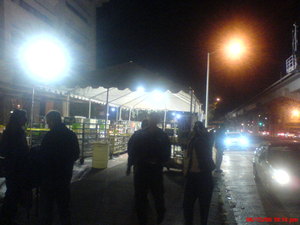tecznotes
Michal Migurski's notebook, listening post, and soapbox. Subscribe to ![]() this blog.
Check out the rest of my site as well.
this blog.
Check out the rest of my site as well.
Apr 16, 2008 6:05pm
money
Jan Chipchase, on "Sente":
Sente is the informal practices of sending and receiving money that leverages public phone kiosks and trusted networks. In Uganda the word Sente has two meanings the first being 'money' and the second 'the sending of money as airtime'. It works like this:
Joe lives in Kampala and wants to send his sister Vicky 10,000 Ugandan Shillings - about 4 Euros. He buys a pre-paid top up card for that amount but instead of topping up his own phone calls the local phone kiosk operator in Vicky's village. The phone kiosk operator uses the credit to top up his own phone, takes a commission of anywhere between 10 and 30% and passes the rest onto Vicky in cash. The kiosk operator then resells the airtime at a profit (it is after all his business).
I love the idea that this currency has a value ceiling, an upper bound defined by the number of people with minutes in the day to talk to one another.
Jack Rusher, on money:
The early Mesopotamians used a weight of barley as their first currency. It seems important to point out to the modern reader, accustomed as she must be to the way modern currency works, that this money was different from the money of today in some very important ways. It was an actual edible commodity that could be used to make soup, bread and beer, for one thing, and for another, it was prone to decay: pests ate it, it tended to rancidity if kept for too long, and so on.
This latter property of the currency was shared with most goods in the economy, all of which fell somewhere along a continuum of impermanence. The impermanent nature of these goods is linked to the underlying ecosystem from which all value ultimately arises; everything that wasn't made of sand (pottery) or metal (tools and jewelry) was the direct product of sunlight and bio-mass, and consequently subject to unavoidable near-term wear and decay.
...
In a very real sense modern economics is still suffering the effects of a 5,000 year old swindle. The modern wisdom that a small rate of inflation is part of a healthy economy comes down to the need to make our silver behave a little more like barley.
There's an upper bound here, as well, defined by how much actual barley can be consumed.
Adam, on twitter:
If I were to design a universal currency that didn't float too badly, I'd base it on avg'd cost of balanced 2000 kCal diet in 200+ markets.
How hard could it be to design a simple currency with these characteristics and set it loose? Second Life has one; seems like all that's needed is an acceptable amount of trust and an exchange rate. Great conversation with Adam exploring this earlier today.
Instead of a gold standard, it would operate on a food bank standard where you traded your tokens in for a single balanced meal when you weren't trading them for goods and services. This also reminds me of petrodollars, another concept connected to the ultimate foundation of value: fueling biological and other activity for the purposes of movement and procreation.
Here's the scene at the 7th street post office when I dropped off my taxes last night at 10pm:
